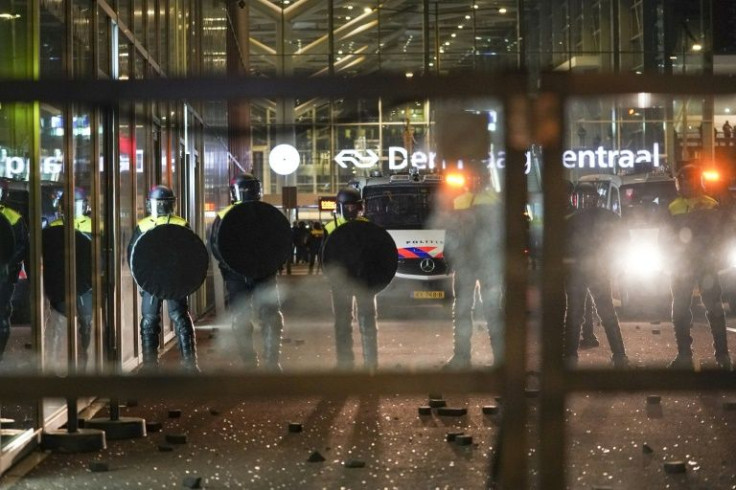Dutch Return To Partial Lockdown As Covid Surges
Dutch Prime Minister Mark Rutte on Friday announced Western Europe's first partial lockdown of the winter, with at least three weeks of Covid curbs on restaurants, shops and sporting events.
Police fired water cannon against hundreds of firework-throwing protesters in The Hague after Rutte unveiled the "annoying and far-reaching" measures to curb a record spike in coronavirus infections.
The crisis required a "hard blow of a few weeks because the virus is everywhere, throughout the country, in all sectors and all ages", Rutte told a news conference on national television.
"Fortunately, the vast majority have been vaccinated, otherwise the misery in the hospitals would be incalculable at the moment."
Bars, restaurants, cafes and supermarkets will have to shut at 8:00 pm for the next three weeks from Saturday, while non-essential shops must shut at 6:00 pm, the Dutch government said.
People will be limited to having four visitors at home and have been advised to work at home unless absolutely necessary.
Public events will be scrapped while football matches including the Netherlands' home World Cup qualifier with Norway next week must be played behind closed doors.
Schools will however remain open, and people will be allowed to leave their homes without restrictions.
The government will review the situation on December 3 to see if further measures are needed, Rutte added.
These could include requiring Covid passes to access the workplace, and allowing bars and restaurants to limit admittance to people who have been vaccinated or who have recovered from the disease, while excluding those who only have a negative test.
Cases have soared since the Dutch government lifted most Covid measures less than two months ago on September 25, reaching a record level of more than 16,000 on Thursday and Friday.
But the restrictions are politically sensitive.
Around 200 protesters gathered outside the justice and security ministry during Rutte's press conference, throwing stones and fireworks at riot police and setting up barricades, AFP journalists saw.

Police then used water cannon to disperse the demonstrators, as loud bangs and chants echoed through the centre of The Hague and mounted police rounded up the stragglers.
The Hague police said on Twitter they had taken action to "restore public order."
The Netherlands suffered its worst riots for four decades in January after the government imposed a night-time curfew to curb a previous Covid surge.
The Dutch football association noted the plans "with great dismay" and was trying to lobby the government not to ban fans from matches.
The catering industry, which has been hit hard by closures during the pandemic, also slammed the latest measures.
"The limit has been reached," Rober Willemsen, chairman of the trade association Koninklijke Horeca Nederland (KHN), told NOS.
Meanwhile the official arrival of Saint Nicholas, or Sinterklaas as he is known in Dutch -- scheduled on Saturday in the historic central city of Utrecht -- has already been cancelled due to the spike in cases.
The nation of 17 million people has reported 2.2 million cases and 18,612 deaths since the start of the pandemic last year.
Hospitals have warned they will not be able to make it through the winter under the current conditions.
The Covid spike comes despite the fact that 82 percent of Dutch people over the age of 12 have been fully vaccinated.
Unvaccinated people account for most intensive care cases (69 percent) and hospital admissions (55 percent), but waning vaccine efficiency, particularly in the elderly, has also been blamed for the surge.
The Dutch government says it will start giving booster jabs in December.
Covid case numbers are on the rise across much of Europe with neighbouring Germany also mulling fresh restrictions and Austria saying it will lock down the unvaccinated.
© Copyright AFP 2024. All rights reserved.





















